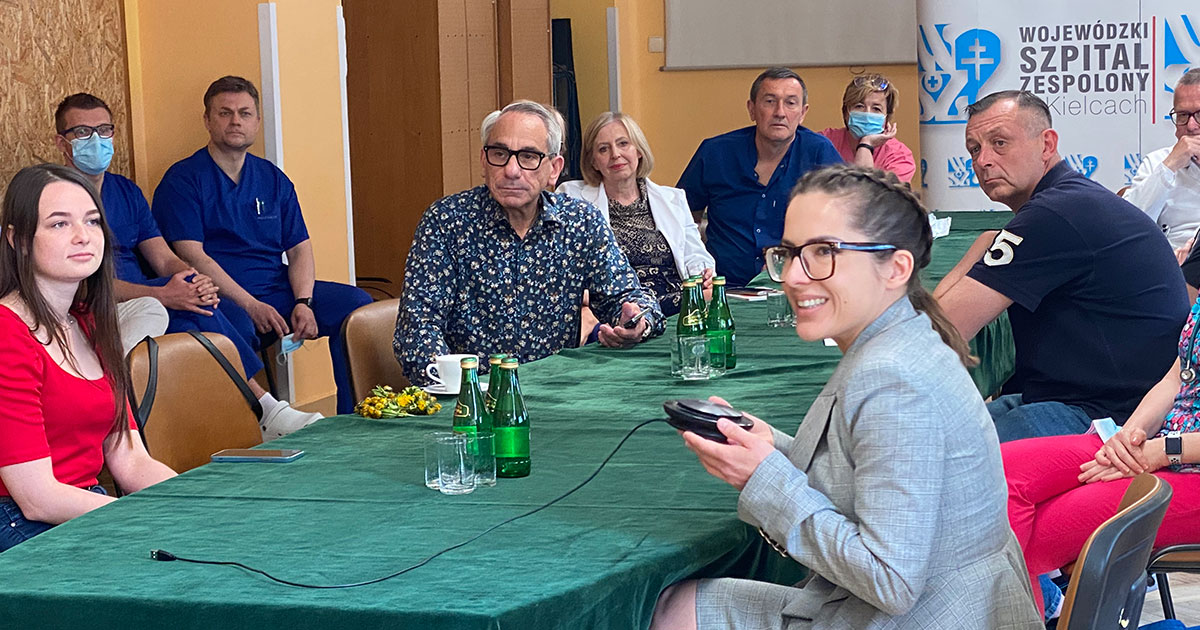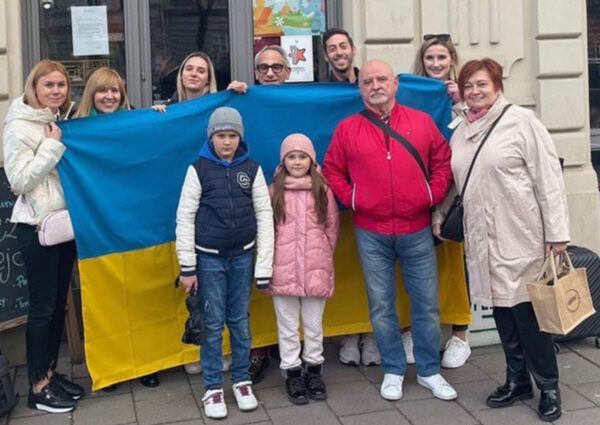An Entrepreneurial Leader in a Time of War

At first, Gary Wasserson ’77 became involved with the war in Ukraine because of family.
Just four days after the conflict broke out, in February 2022, the Philadelphia-area resident learned he had distant relatives in the country, cousins on his mother’s side he hadn’t known about previously. Wanting to help, he initially was going to send them money, but then thought better of it. “What good will money do?” he thought. “I’ve got to get them out of there.”
In short order, Wasserson flew to Krakow, Poland, and organized a team of people who brought his relatives to safety. Near the border in Poland, he met five of his cousins for the first time, and that’s when everything changed for Wasserson. Looking at his relatives, he thought of history, and he thought of his responsibility.
“Something hit me,” he says. “What I saw in their eyes was the same blank, deer-in-the-headlights, mesmerized stare of the Holocaust survivors when they were liberated. It went down my spine like a bolt of lightning. I realized at that moment I was there to get more than my relatives out.”
That was March 2022. Since then, Wasserson has been deeply involved with assisting those affected by the war. Through relentless networking and connecting with people and organizations, he has created a large support network of what he calls “angels” to help Ukrainians in need.
That network has helped refugees leave Ukraine and settle elsewhere, and it also has assisted with a wide variety of other needs, including helping Ukrainians receive cancer treatment and prosthetics, making sure that Ukrainian veterans have mental health assistance, and creating a summer camp in Warsaw, Poland, for Ukrainian children so they can have a sense of normalcy and fun.

In Krakow, Poland, Gary Wasserson ’77 (center, back row) stands with the Blotner family, Wasserson’s distant relatives who he helped bring to safety from Ukraine. In thanks, the family gave Wasserson a Ukrainian flag.
Earlier this year, he was mentioned in various news reports detailing how he arranged for a badly wounded Ukrainian soldier to come to the U.S. so he could have surgery to save his legs. “There is always something to do,” Wasserson says. “Every day, it is something.”
Such myriad efforts take management and leadership expertise to pull together, and even though he graduated from Babson more than 40 years ago, Wasserson credits his College education for giving him just that. “I have the organization and people skills needed to get the job done. That is the primary asset I’ve had in doing what we do,” he says. “Babson is an incubator for leaders, and leaders get things done.”
Give of Yourself
An entrepreneur and businessman, Wasserson has enjoyed a long and successful career. He built two public companies—one a provider of voice and data services, and the other a prepaid calling card company, the first of its kind at the time. Now technically retired, he still takes time to run Wasserson Design, a small home theater and home automation company.
When he looks at his life, Wasserson sees it as a balance sheet. He wants to leave the world better off than when he first entered it. “It is one thing to accumulate wealth. It’s another thing to give of yourself,” he says. “You should be a contributor not a taker. My job is to improve upon the world, instead of taking away from it.”
In the war’s early days, after coordinating the rescue of his relatives, Wasserson immediately began to brainstorm. “I thought about every relationship I had, what I could do,” he says. “I started playing connect the dots.”
“I have the organization and people skills needed to get the job done. That is the primary asset I’ve had in doing what we do. Babson is an incubator for leaders, and leaders get things done.”
Gary Wasserson ’77
Since then, he has spent some 80 nights in a Warsaw hotel, coordinating efforts on the ground. He estimates that he has worked with hundreds of people. Early on, he was able to locate drivers and buses to ferry people to safety from Ukraine. In four weeks, they transported thousands of Ukrainians. “At one point, we had 36 drivers running back and forth every day,” he says.
Many other efforts have followed, from making sure Ukrainian cancer patients can receive treatment in Poland to bringing together American and Ukrainian veterans so they can support each other’s mental health. Wasserson also has joined the board of directors of Ukrainian Children, a nonprofit that supports Ukrainian families in need.
Wasserson has gotten so good at making connections that others seek him out for issues beyond Ukraine. He recently received a call from a large North Carolina church that needed assistance. The church couldn’t figure out how to ship the tons of goods it had collected to help Turkey in the aftermath of February’s destructive earthquake there.
“The only person I could think of to make this happen is you,” said the church pastor, who had previously worked with Wasserson on Ukraine relief. Wasserson replied, “I’ll call you back.” Through his connections, he landed a meeting at the Turkish consulate in Miami, and a cargo plane was ultimately procured to take the goods to Turkey.
An Act of Kindness
Wasserson admits that his work can be hard and exhausting, especially given the stakes. “The stress is crazy,” he says. “This is people’s lives. This is life or death.”
He hopes that his efforts inspire others to make a difference in some small way in their communities. “Just doing something simple as an act of kindness can have a ripple effect,” he says. “It can change the world.”
For all his work in Ukraine, Wasserson was recognized on the floor of the House of Representatives on March 9. “Thank you, Gary,” said Representative Susan Wild of Pennsylvania, “for your compassion, for your willingness to act, and for your dedication to standing with the Ukrainian people.”
Read more about how the war in Ukraine has affected the Babson community:




